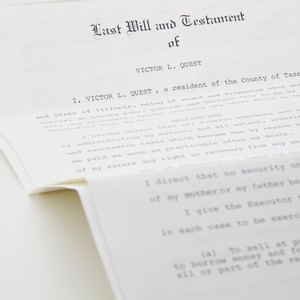
Some people only hold legal title to their real estate during their lifetime and upon their death, legal title will pass to another specific person called a remainderman. However, property law does tell us what happens to the property if the remainderman dies first.
Tips
If the remainderman in a life estate deed dies, the rights will go to the remainderman's estate and will be distributed according to his will.
Property Rights: A Bundle of Rights
Rights in real estate are often described as a bundle of sticks that can be distributed between more than one person. General property rights include the rights of possession, control, use, enjoyment and disposition -- such as selling, transferring, and devising the property by will. A tenant, for example, may have the rights of possession, control, use, and enjoyment, but not disposition. Another example is a business that has gas, oil, and mineral rights that allow it to enter the property for purposes of extraction.
Life Estate vs. Fee Simple
If you hold fee simple title to property, you hold all the sticks in the bundle. If you hold a life estate, you have most of the same rights, but only during your lifetime. This means that you cannot transfer your property by will because your right to the property ends at your death and goes to the remainderman. You can transfer your rights to the property during your lifetime, but transferred rights will terminate at your death.
Remainderman's Rights Usually Survives His Death
Sometimes the remainderman will die before the holder of the life estate does. However, that doesn't change anything as it concerns the life tenant. You still only have a life estate. The rights to the property will go to the estate of the remainderman and will be transferred according to the terms of the remainderman's will or through the intestate probate process if no will exists. For example, if a remainderman dies, the property may be distributed to her children by will after your death.
Remainder Interests Subject to Divestment
Sometimes a remainder interest is subject to divestment. For example, a will may provide that Bob gets the property for life, then Tom gets the property, but if Tom dies before Bob, then Jim gets the property. Thus, Tom is divested of his interest upon his death if he dies before the life tenant. A partial divestment can occur where the remainderman is a child and any future children. In this situation, the first born is partially divested of his interest -- he doesn't get sole ownership.
References
- Legal Infomation Institute: Life Estate
- USLegal: Bundle of Rights [Property Law] Law & Legal Definition
- Legal Information Institute: Future Interst
- LegalBeagle: What Happens if the Remainderman in a Life Estate Deed Dies?
- Washington State Health Care Authority. "Life Estates." Accessed Aug. 1, 2020.
- American Council on Aging. "How Lady Bird Deeds Protect a Medicaid Recipient’s Home for Their Loved Ones." Accessed Aug. 1, 2020.
- University of Maryland College of Agriculture and Natural Resources. "The Life Estate Deed—Look Before You Leap!" Accessed Aug. 1, 2020.
- The People's Law Library of Maryland. "Life Estates." Accessed Aug. 1, 2020.
Writer Bio
Shawn M. Grimsley holds a bachelor's degree in political science, master's degree in public administration and a Juris Doctor. He practiced law for 10 years, focusing on general business law, securities law, real estate and civil litigation. Grimsley now serves as a teacher and writer.

